10 Faculty Across the Disciplines Recognized with Tenure, Promotions
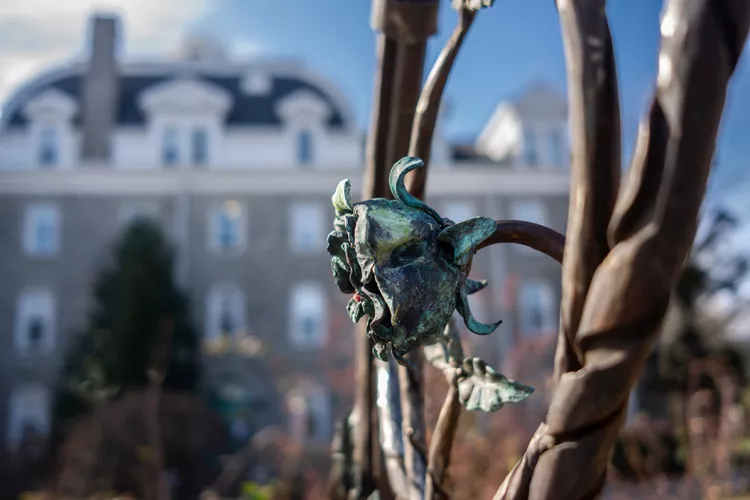
At the February meeting of the Board of Managers, 10 faculty members were approved for promotion.
Nine faculty members received tenure and promotion to associate professor:
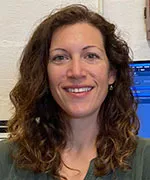
Dawn Carone, Biology
Geneticist Dawn Carone investigates functional roles for repetitive elements in the human genome and the implications of misregulation of repetitive elements in disease. Her lab uses molecular cytology and biochemical tools to examine the expression of repetitive sequences within their nuclear environment, in order to identify and investigate their interacting partners. Current projects in the lab aim to understand both the cause and consequence of locus-specific expression of HSATII, a pericentric, tandemly repeated satellite sequence, in cancer cells. In 2017, Carone received a $150,000 grant to research uncontrolled growth in cancer cells, funding designed to empower scientists shedding new light and crossing interdisciplinary boundaries. Her work is currently funded by an AREA grant from the National Institutes of Health to uncover the functional consequences of pericentric satellite DNA expression and to map expressed pericentric satellite sequence variants.
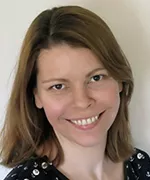
Désirée Díaz, Spanish
Désirée Díaz specializes in Latin American literature and visual culture with an emphasis on the Hispanic Caribbean. Her first book, Ciudadanías liminales. Vida cotidiana y espacio urbano en la Cuba postsoviética (Almenara, 2021), explores the emergence of alternative forms of citizenship and the production of an independent public sphere in post-Soviet Cuban literature and visual culture. Díaz’s research interests also include the Latino cultural production in the U.S., human and cultural geography, diaspora and transnational movements, as well as popular and material cultures. At Swarthmore, Díaz is a member of the Spanish Department and the interdisciplinary programs of Latin American and Latino Studies and Black Studies. Díaz earned her Ph.D. in Spanish from the University of Wisconsin–Madison and her bachelor’s degree in history of art from the University of Havana.
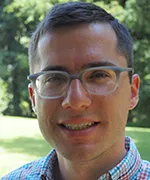
Brian Goldstein, Art and Art History
Brian Goldstein’s research and teaching focus on the history of architecture and urban planning, especially in the U.S. in the 20th century. Specifically, he examines the intersection of social movements, political ideology, and the built environment; the formal and spatial implications of race and class; the history of African Americans in the design professions; and the efforts of community-based organizations to transform urban development. Broadly, his work explores how people of different races and ethnicities, classes, and levels of formal training have imagined and shaped the future of American places. He received the 2020 John Friedmann Book Award from the Association of Collegiate Schools of Planning for his book The Roots of Urban Renaissance: Gentrification and the Struggle Over Harlem (Harvard University Press, 2017), which chronicles the history of the neighborhood’s redevelopment from the early 1960s to the early 2000s. He is currently writing a book on the life and work of architect J. Max Bond Jr., under contract with Princeton University Press.
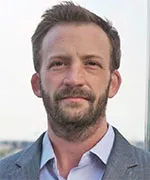
Daniel Laurison ’99, Sociology & Anthropology
Sociologist Daniel Laurison ’99 studies class inequality and American politics. He approaches projects with an interest in how the world looks different to people in different social positions, and with a commitment to taking seriously the deep connections between economic inequality, racial inequality, and racism. He was one of 26 scholars in the humanities and social sciences to receive the 2021–2022 Andrew Carnegie Fellowship, to further his research on poor and working-class people’s views of politics and voting; as part of this project, he recently started a Politics and Inequality research lab with the support of the Lang Center for Civic and Social Responsibility. Laurison is the associate editor of The British Journal of Sociology. His last book was The Class Ceiling: Why It Pays to Be Privileged, and his next book is Producing Politics: Inside The Exclusive Campaign World Where the Privileged Few Shape Politics for All of Us.
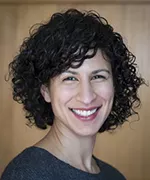
Sangina Patnaik, English Literature
Through her teaching and research, Sangina Patnaik investigates global modernism, critical legal studies, and human rights. She is completing a project titled “Telling Truths: Literature, Law, and the South African Truth and Reconciliation Commission,” which draws together literary, legal, and political responses to the TRC to show how studying fictional narratives is a necessary component of understanding how 20th-century human rights have become increasingly reliant on narrative form. Patnaik is also working on a book project titled What We Owe: Reparations, Human Rights, and Twentieth-Century Literature, which explores narrative forms of accounting for violence. She recently participated in a Modern Studies Association virtual exhibit, “Wanting Everything: Tactics, Rights, and Queer/Feminist Care,” for the Columbia University Press. For her dissertation, Patnaik explored “The Wake of War: Reparation in Law and Literature” at the University of California, Berkeley.
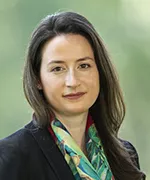
Jennifer Peck ’06, Economics and Environmental Studies
Jennifer Peck ’06 researches the development of resource-rich countries, linking topics in labor, development, and energy economics. Her recent work examines the labor market in Saudi Arabia, focusing on women’s labor supply, firm-level labor demand, and the impacts of government labor policies on the private sector. Her research has been supported by grants from the Harvard Kennedy School, the Abdul Latif Jameel Poverty Action Lab, and the Morocco Employment Lab. She recently co-authored a study, “Simulating COVID-19 in a University Environment,” which projected how the coronavirus could spread across campuses in fall 2020 and the steps schools could take to minimize its impact. Before coming to Swarthmore, Peck was a research affiliate in the Evidence for Policy Design group at the Harvard Kennedy School and a postdoctoral research associate at the Massachusetts Institute of Technology.
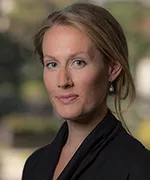
Emily Paddon Rhoads, Political Science
The teaching and research interests of Emily Paddon Rhoads span the fields of international relations, comparative politics, and peace and conflict studies. She is author of Taking Sides in Peacekeeping: Impartiality and the Future of the United Nations (Oxford University Press, 2016) and co-editor of the forthcoming Civilian Protective Agency in Violent Settings: A Comparative Perspective (Oxford University Press). She has conducted fieldwork in the Congo, South Sudan, the Central African Republic, and Iraq. Her research has been supported by the European Research Council, the Trudeau Foundation, Global Affairs Canada, and the Swedish International Development Cooperation Agency. In 2020, she served as academic adviser to the United Nations Review of Peacekeeping Responses for the Secretary-General’s Executive Committee. At Swarthmore, Paddon Rhoads’s roles include faculty adviser for the College’s three-year partnership with the Pulitzer Center on Crisis Reporting and faculty mentor in the Richard Rubin Scholar Mentoring Program.
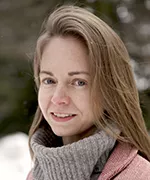
Olivia Sabee, Dance
Working at the intersection of literature, history, and dance studies, Olivia Sabee is a scholar of 18th- and 19th-century France and Franco-Italian cultural exchange. Her book Theories of Ballet in the Age of the Encyclopédie (Oxford Studies in the Enlightenment, 2022) examines 18th-century ballet's construction through print culture, following two parallel paths — standalone treatises on ballet and dance and encyclopedias — to trace the shifting definition of ballet over the second half of the 18th century. A choreographer as well as a scholar, Sabee’s work has been presented at Washington, D.C.’s Dance Place, Sidney Harman Hall, and the John F. Kennedy Center for the Performing Arts. Her teaching includes classes in dance studies, choreography, and studio practice. She previously served as director of the Dance Department and is a member of the interdisciplinary programs in Comparative Literature and Interpretation Theory.
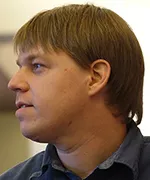
Jonathan Washington, Linguistics
The main areas of linguist Jonathan Washington’s work include Turkic languages, especially Kazakh and Kyrgyz; articulatory and acoustic properties of vowel systems; sonority and syllable margin phonology; language technology for marginalized languages; computational descriptions and implementations of grammatical patterns (finite-state morphology and phonology, dependency syntax); the history of the Turkic languages; and comparative Turkic linguistics. At Swarthmore, he also directs the Phonetics Lab, which is used to record speech in a sound-reduction booth and analyze the articulation of vowels and consonants using ultrasound imaging technology. Located in Pearson Hall, the lab supports teaching, student research, and faculty research. Washington earned his Ph.D. in linguistics and Central Eurasian studies from Indiana University, after earning master’s degrees in Central Eurasian studies and linguistics at Indiana University and the University of Washington, respectively. He studied linguistics and anthropology as an undergraduate at Brandeis University.
One faculty member was promoted from associate to full professor:
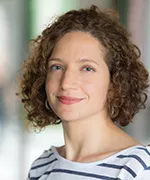
Ayse Kaya, Political Science
Ayse Kaya is an expert on international political economy, particularly international financial institutions such as the International Monetary Fund, the World Bank, and the Asian Infrastructure Investment Bank, and has done extensive research on the U.S. central bank, the Federal Reserve, and its approach to inflation and unemployment. Her peer-reviewed publications span other issues on economic globalization, such as public opinion toward global institutions, the governance of climate change, and global economic inequality. Her book on international financial institutions, Power and Global Economic Institutions, was published by Cambridge University Press (2015/2017). At Swarthmore, Kaya co-founded the College’s Global Studies Program, which she co-coordinates. She has also served as chair of the Department of Political Science and a member of the Council on Educational Policy and of the Committee on Faculty Procedures. She has also chaired the Phi Beta Kappa chapter of the College and twice been chosen by the graduating class to speak at Commencement (2014 and 2021). Previously, Kaya held visiting positions at Columbia University and the University of Pennsylvania. She was born and raised in Istanbul, Turkey.



